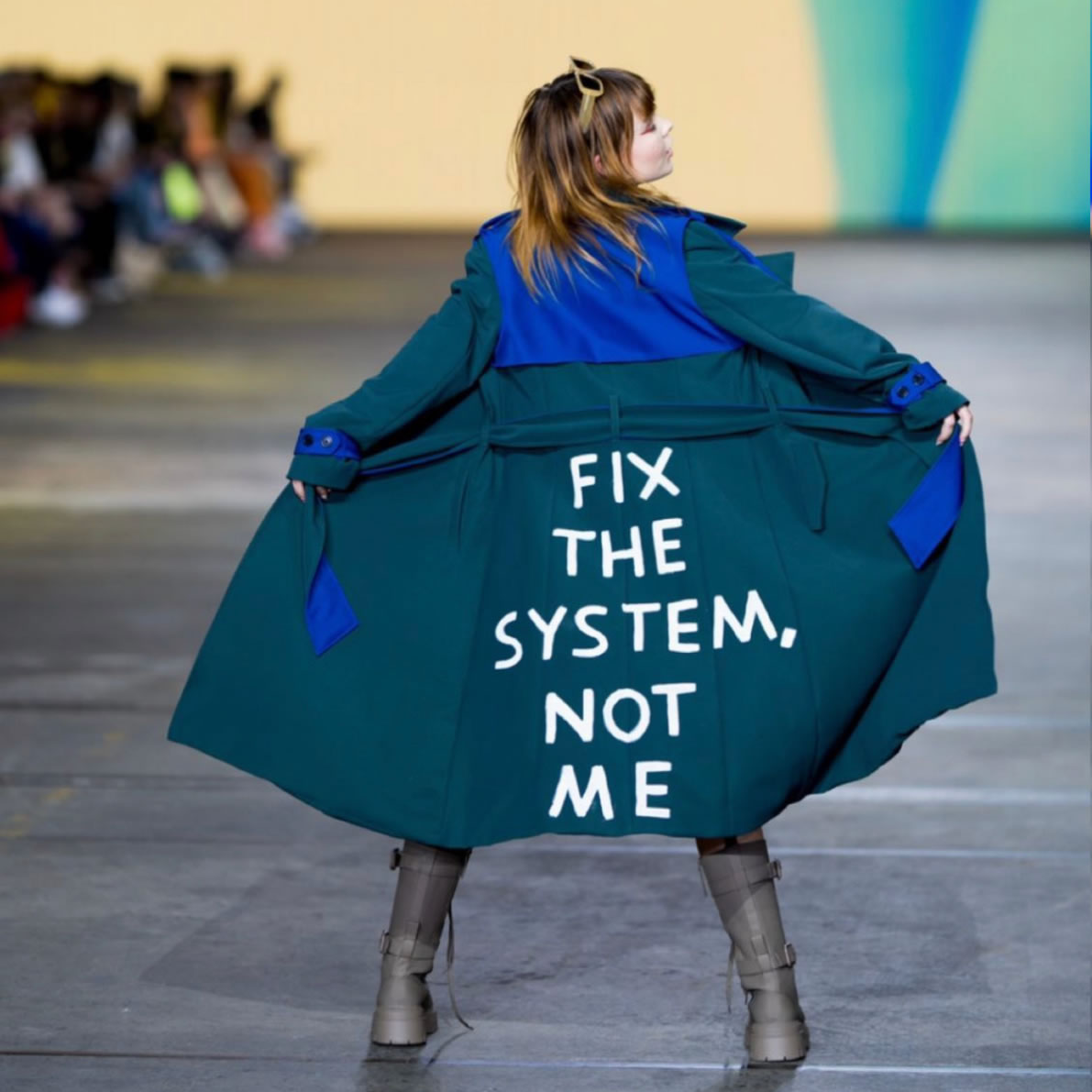Austim, sexuality, and representation - Parker C.


Description:
My artifact focuses on Chloe Hayden, an autistic Australian actress, influencer, and advocate. She is most known for her social media presence and role in “Heartbreak High” The image is of Chloe on a runway wearing a jacket that says “Fix the system, not me” a statement that focuses on how disabled people are treated in society.
Significance:
I chose this artifact because I believe there is a lack of representation of AFAB people (assigned female at birth) with autism. Chloe is breaking these barriers down by being an active voice on social media, and in film. She is educating people about how autism presents in girls, and how society treats them differently from autistic men and boys. Her work has also led her to talk about sexuality and queerness within the autistic community. Her acting career has also shown queer representation in the media, as her character in “Heartbreak high” is an autistic lesbian who is navigating her way around relationships with her friends and with her girlfriend Sasha. Her activism and social media presence has highlighted the need for a better understanding of AFAB autistic people. For too long, the representation of autistic people in the media has not been accurate and has often been portrayed by neurotypical people. Therefore, people such as Chloe Hayden are so important for autistic, and non-autistic people. Representation is important on an interpersonal level for autistic people, but it is also important for non-autistic people, as they can see accurate representation of autistic people, so they can hopefully understand autism and autistic people better.
Positionality:
Disability and sexuality are interesting to me as I have not had a lot of experience with learning about disability and sexuality in an academic context. I believe that it is important for everyone to have some sort of academic knowledge about both topics. Most of us walk around the world, not having a great understanding of how these two topics intersect with one-another. I personally feel that this is an area that education has failed us in. A lot of our sexual education classes focus on abstinence and makes sexuality a “taboo” topic, and unfortunately, we carry these beliefs around as adults. I believe that it is important for society to see sex and sexuality as something that everyone experiences, and that disabled people experience it to. By talking about sexuality and disability in an academic space, people can normalize conversations around sexuality and disability. This topic is of interest to me as I believe that everyone should be able to express themselves sexually, or not sexually at all if that is what they wish. It is important for me to dismantle my own negative views around sex that have been taught to me via the education system. In doing this I can become more “sex-positive” and realise that sex is something that is enjoyable, and not taboo.
Impact:
This subject has positively impacted me in many ways. For starters I have been able to see how the education system has failed many generations of people, by viewing sex as something that is “wrong” or “dirty”. For years, young women are often pitted against each other regarding their sexuality. Women are shamed for having sex, but they are also shamed for not having sex. School yard gossip makes this possible at a relatively young age. I remember being in high school and believing that other girls were “sluts” for being sexually active, when in reality they had every right to be exploring their sexuality as long as it was consensual. It was normalised for the girls to talk about each other in this way, and no one really did anything about it. None of us had a positive role model in our lives to tell us that having sex is okay and normal, and we suffered for it. Of course, now I realise that my views and actions could have had harmful impacts on these girls, but in the moment, I could only think of what was taught to me by the education system. Therefore, this subject has allowed me to look into myself, and see that the things that I have been talk about sex and sexuality have, for the most part, been a fabricated lie to suppress my own sexuality.
Wish List:
I hope my artifact and presentation makes viewers consider how they view disabled people in society, especially disabled people who express their sexuality openly. I hope that they are able to look into themselves and think “am I contributing to sex-negativity?” I also hope that they walk away with a better understanding of autism in AFAB people, and how society treats autistic AFAB people differently to autistic AMAB (assigned male at birth) people. My main goal of my project is to express the importance of accurate representation in the media, and focus on how Chloe Hayden has been able to do this in her role as Quinni in “Heartbreak High” and how this has been a revolutionary role for accurate autistic representation. I also want to highlight the importance of Quinni’s sexuality. Society does not value queer people for the most part, so Hayden’s character being a lesbian is even more important for disabled, and queer representation. I want viewers to understand that autistic people are not incapable of queerness, and that autistic queer people are everywhere, many of my friends are queer and/or autistic. I also want to highlight how these two groups intersect, and how the queer community can also be ablest at times. I want them to understand that autistic people have, for the most part, the same desires, wishes, and needs as non-autistic people, and that wider society needs to stop viewing autistic people as incapable of having the same sexual experiences as non-autistic people.
Comments are closed.



One Comment
Hi Parker, you have done an amazing job on choosing an artifact and being able to articulate the message and importance of it.
Having a positive approach to sexuality and disability is very important and you have touched on this a lot throughout which I really liked. I also really liked how you focused on a specific disability, I feel you were able to better elaborate on your points which made your information enjoyable to read. You mention the concept sex negativity a few times which I find quiet interest the whole concept of sex negativity and sex positive because like Fava 2021 pointed out sex negativity just promotes what society claim as acceptable sexuality and your arguments go against this in a very well done and interesting way. I think you made a bold choose by using a known public figure to base your artifact image on however it was a good choice as you were able to draw conclusions from this individuals disabilities and the role she plays in society as a disabled and sexual human.